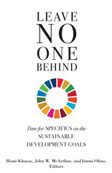Leave No One Behind: Time for Specifics on the Sustainable Development Goals

In 2015, all 193 member states of the United Nations adopted the Sustainable Development Goals (SDGs) and pledged to ensure that “no one will be left behind.”
It has been four years since the adoption of the SDGs, but the world has still not progressed beyond business as usual and is not on track to achieve the SDGs. The number of chronically malnourished people has increased, official development assistance to the least developed countries has declined, and absolute deprivation continues to persist within high-income countries.
This volume offers an effort to transform “leave no one behind” (LNOB) from a slogan to specifics. It includes a special emphasis on problems of absolute deprivation and basic needs. Certain chapters draw attention to intersectionality within LNOB issues where some individuals face high levels of absolute deprivation on multiple dimensions. Chapters also highlight gaps in current data that limits information on who is getting left behind, where, and the cause.
This book is the result of a joint effort between the JICA Research Institute (JICA-RI) and Global Economy and Development program at the Brookings Institute. JICA-RI Director Izumi Ohno is one of the editors and authors of the book. JICA-RI Executive Senior Research Fellow Saeda Makimoto, Research Fellows Eiji Yamada and Enerelt Murakami, as well as Visiting Scholar Akira Murata contributed chapters to the book.
Individual chapters of the book are now available for download on the dedicated book page of Brookings Institute.